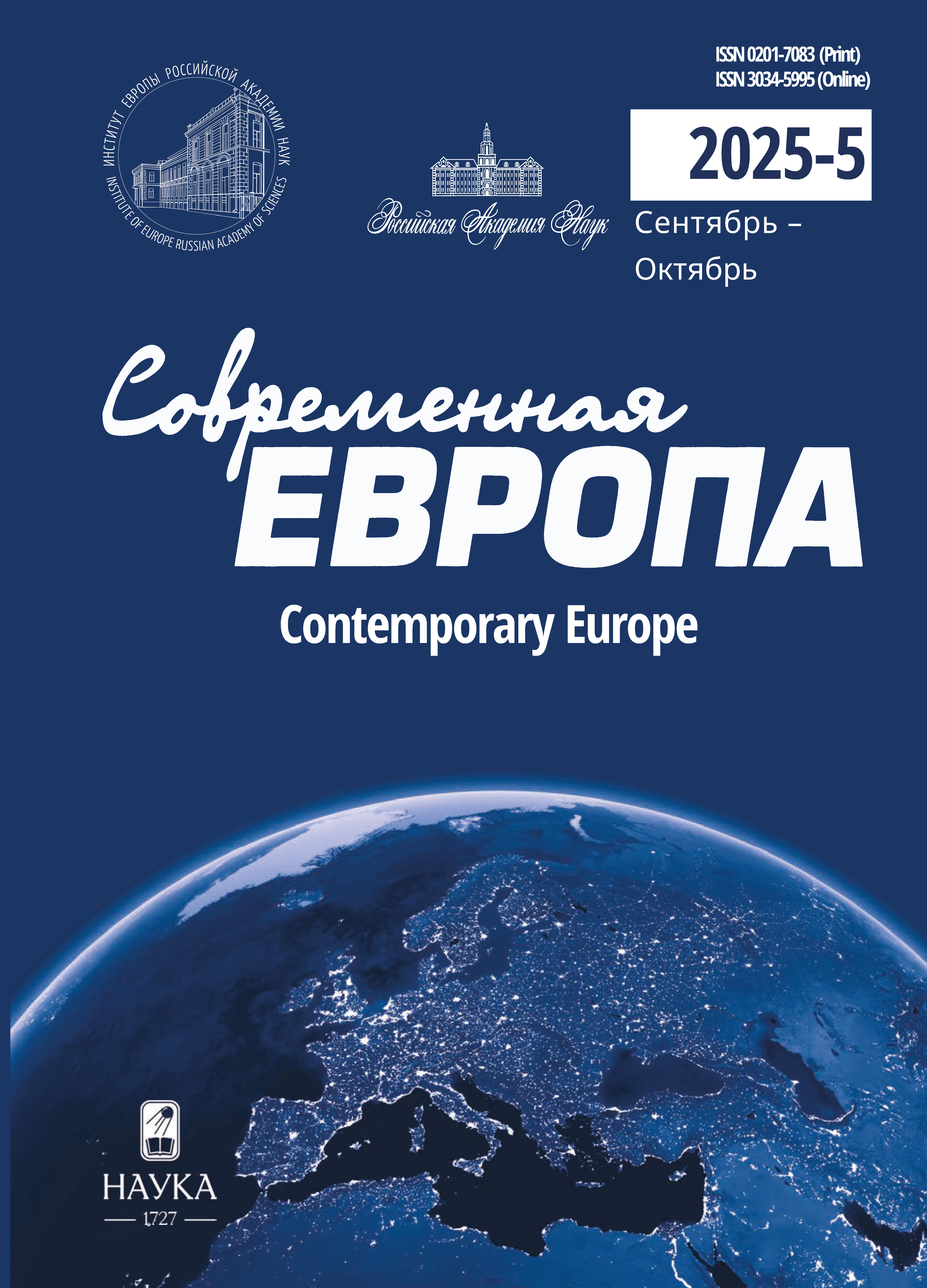Artificial Intelligence in the Politics of the EU and China
- Authors: Litvak N.V1, Pomozova N.B2
-
Affiliations:
- MGIMO
- HSE University
- Issue: No 4 (125) (2024)
- Pages: 30-44
- Section: EUROPEAN PROCESS: COUNTRIES AND REGIONS
- URL: https://rjsvd.com/0201-7083/article/view/652331
- DOI: https://doi.org/10.31857/S020170832404003X
- ID: 652331
Cite item
Abstract
The article analyzed different concepts of the regulation of the artificial intelligence in the context of the competition between EU and China. In just the last few years artificial intelligence has evolved from academic research and futuristic discussions into the most dynamically developing practice. The speed and scale of implementation of this technology, and even more so, the prospects, are confusing an increasing number of people ‒ from politicians and businessmen to ordinary citizens and the developers of these AI systems themselves. As a result of a comparative interdisciplinary study of the approaches of the European Union and China to the topic of artificial intelligence, common and distinctive features that are determined by value differences have been identified. The main difference, according to the Europeans themselves, is ethics based on the European understanding of human rights. Modern China, challenging global primacy, is promoting its concept in this area. The examples of problems of ethics, competition, and security show the differences in the regulation of AI implementation processes, as well as the uncertainty that increasingly determines the actions of European politicians. This may contribute to an ideologically determined loss in competition in the field of artificial intelligence. It is possible that, despite solemn statements, Europe will have to use elements of the Chinese pragmatic approach to the problem.
Keywords
About the authors
N. V Litvak
MGIMO
Email: koloc1918@mail.ru
Doctor of Sciences (Sociology) Professor of the Department of Philosophy Moscow, Russia,
N. B Pomozova
HSE University
Email: npomozova@mail.ru
Doctor of Sciences (Sociology) Leading Researcher of the Centre for Comprehensive European and International Studies (CCEIS), Faculty of World Economy and International Affairs, Moscow, Russia
References
- Gadzhimuradova G. I. (2021). Informacionnye tekhnologii i protivodejstvie razlich-nymvidam ekstremizma v epohu globalizacii. Nauchnyj rezul'tat [Information technologies and countering various types of extremism in the era of globalization. Scientific result], Sociologiya i upravlenie, 7(2), pp. 40‒48. (In Russian).
- Galickaya N.V. (2022) Pravovye aspekty antiterroristicheskoj bezopasnosti: opyt sovremennogo Kitaya [Legal aspects of anti-terrorist security: the experience of modern China], Administrativnoe i municipal'noe pravo, 3, pp. 34‒46. (In Russian).
- Grachev S.I., Kornilova K.A. (2020). Obsuzhdenie kontrterroristicheskoj politiki FRG v publichnyh vystupleniyah glav klyuchevyh ministerstv (2013‒2018 gg.) [Discussion of Germany's counter-terrorism policy in public speeches of the heads of key ministries (2013‒2018)], Vestnik Nizhegorodskogo universiteta im. N. I. Lobachevskogo, 4, pp. 14‒22. (In Russian).
- Gromyko Al.A. (ed.) (2022) Evropa v krizisnom mire [Europe in a world of crisis], “Ves Mir”, Moscow, Russia. doi: 10.55604/9785777708953 (In Russian).
- Litvak N.V., Pomozova N.B. (2021) Konceptual'nye podhody k pravam cheloveka v Evropejskom soyuze i KNR [Conceptual approaches to human rights in the European Union and China], Sovremennaya Evropa, 5, pp. 56‒67. DOI: http://dx.doi.org/10.15211/soveurope520215667 (In Russian).
- Marx K., Engels F. (1955) Manifest Kommunisticheskoj partii [Manifesto of the Communist
- Party], in Works, 4, Gosudarstvennoe izdatel'stvo politicheskoj literatury, Moscow, Russia. (In Russian).
- Уланова А.Е. (2020) Образ противника технологий в рассказе А. Азимова «Раб корректуры»: современная интерпретация. Концепт: философия, религия, культура. Т. 4. № 2(14). С. 135‒143. DOI: https://doi.org/10.24833/2541-8831-2020-2-14-135-143
- Clarke S., Whittlestone J. (2021) Submission of Feedback to the European Commission’s Proposal for a Regulation laying down harmonised rules on artificial intelligence. Centre for the Study of Existential Risk, Cambridge, UK. URL: https://www.cser.ac.uk/resources/feedbackeuropean-regulation/ (дата обращения: 16.01.2024).
- Gaida J., Wong-Leung J., Robin St., Cave D. (2023) ASPI’s Critical Technology Tracker: The global race for future power. Australian Strategic Policy Institute. 22.09. URL: https://www.aspi.org.au/report/critical-technology-tracker (accessed: 16.01.2024).
- Nikolinakos N.T. (2023) The Proposed Artificial Intelligence Act and Subsequent ‘Compromise’ Proposals: Commission, Council, Parliament. EU Policy and Legal Framework for Artificial Intelligence, Robotics and Related Technologies ‒ The AI Act. Law, Governance and Technology Series. Vol. 53. Springer, Cham, Switzerland. P. 327–741. DOI: https://doi.org/10.1007/978-3-031-27953-9_8
- Oud M., Drinhausen K. (ed.) (2021) The Decoding China Dictionary. Raoul Wallenberg Institute of Human Rights, Lund, Sweden. 63 p. URL: https://rwi.lu.se/wpcontent/uploads/2021/03/Decoding-China-Publication_FINAL.pdf (дата обращения: 16.01.2024).
- Roberts H. (2022) Informational Privacy with Chinese Characteristics. The 2021 Yearbook of the Digital Ethics Lab. Ed. by J. Mökander, M. Ziosi. Springer, Cham, Switzerland. P. 9–23. DOI: https://doi.org/10.1007/978-3-031-09846-8_2
- Rozi F. (2020) Confucian Concept of Self-Cultivation and Social Harmony. International Journal of Language & Linguistics. Vol. 7(2). P. 129–136. doi: 10.30845/ijll.v7n2p15
- Schneeberger D., Röttger R., Cabitza F., Campagner A., Plass M., Müller H., Holzinger A. (2023) The Tower of Babel in Explainable Artificial Intelligence (XAI). Machine Learning and Knowledge Extraction. Ed. by A. Holzinger, P. Kieseberg, F. Cabitza, A. Campagner, A.M. Tjoa, E. Weippl. Springer, Cham, Switzerland. P. 65–81. DOI: https://doi.org/10.1007/978-3-031-40837-3_5
- Tommasi S. (2023) Risk-Based Approach in the Digital Services Act and in the Artificial Intelligence Act. The Risk of Discrimination in the Digital Market. Springer, Cham, Switzerland. P. 73‒83. DOI: https://doi.org/10.1007/978-3-031-43640-6_5
- Wang Z., Yu Q. (2015) Privacy trust crisis of personal data in China in the era of Big Data: The survey and countermeasures. Computer Law & Security Review. No. 31(6). P. 782–792. DOI: https://doi.org/10.1016/j.clsr.2015.08.006
- Wörsdörfer M. (2023) The E.U.’s artificial intelligence act: an ordoliberal assessment. AI Ethics. DOI: https://doi.org/10.1007/s43681-023-00337-x
- Yao X. (1999) Confucianism and its Modern Values: Confucian moral, educational and spiritual heritages revisited. Journal of Beliefs & Values. No. 20(1). P. 30‒40. DOI: https://doi.org/10.1080/1361767990200103
Supplementary files











